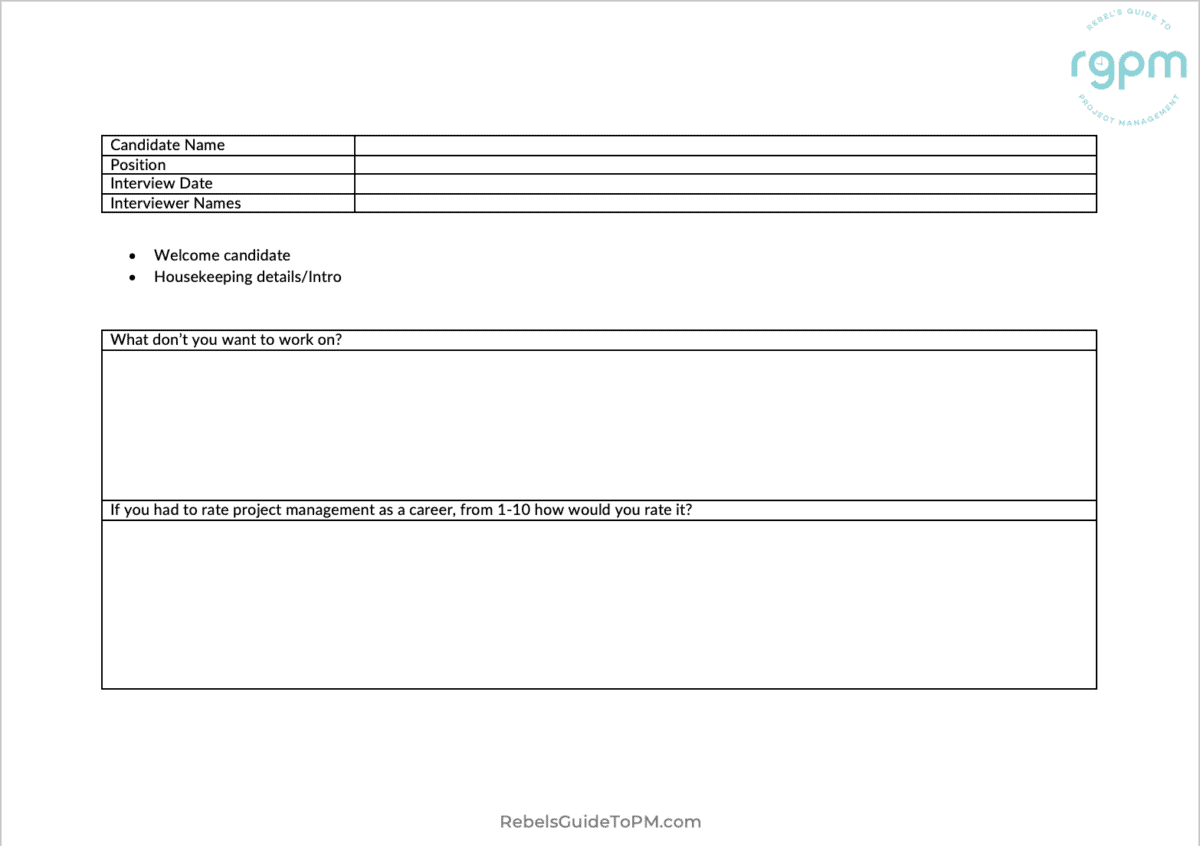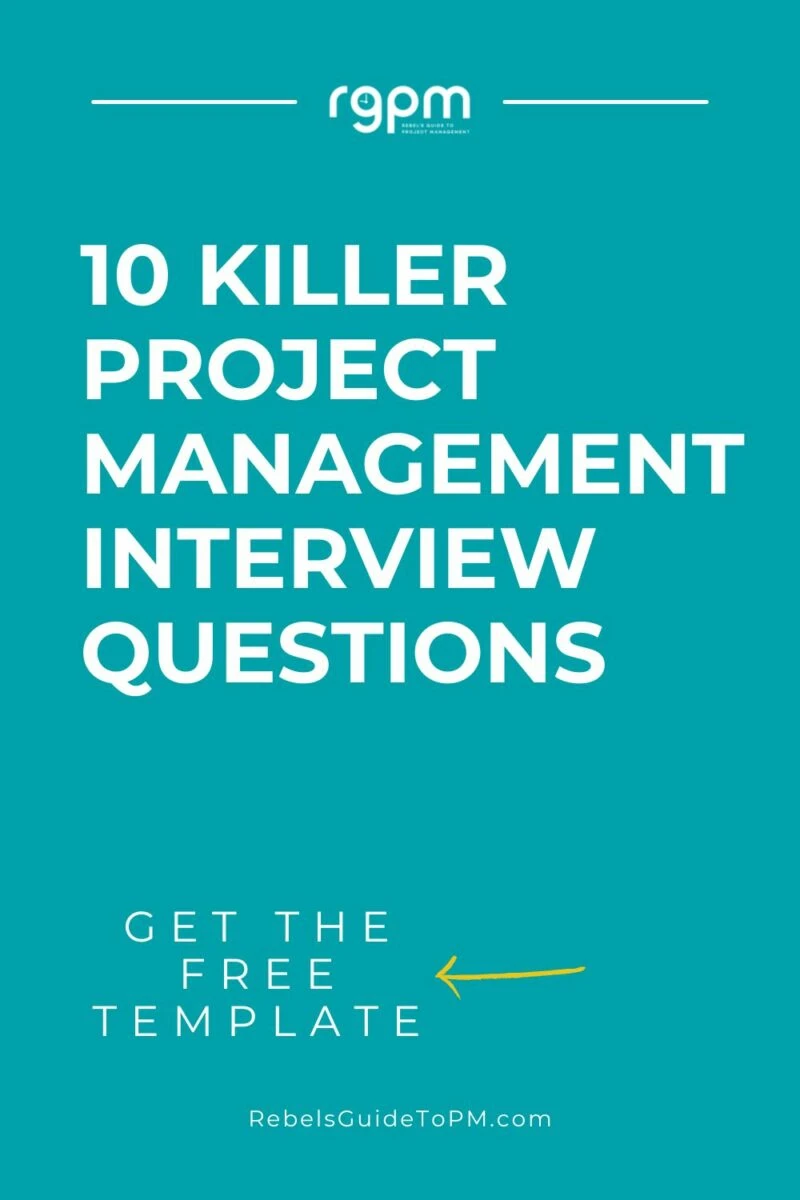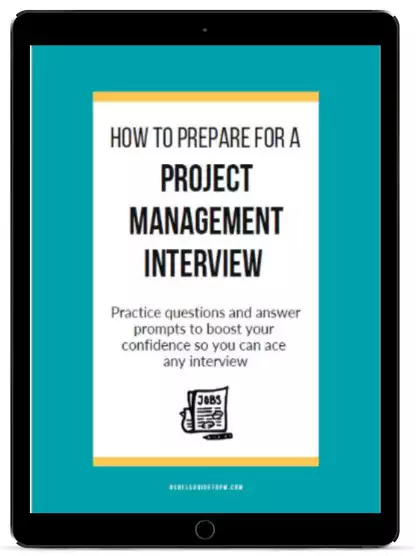How to answer any project management interview question + free interview template
This blog is reader-supported. When you purchase something through an affiliate link on this site, I may earn some coffee money. Thanks! Learn more.
Are you here because you’ve just been offered an interview and want to prepare? Or because you have an open vacancy and are looking for questions to ask in a project management interview?
Either way, I have the answers for you.
The following questions give you plenty of things to ask (as the interviewer) and answer (as the candidate) in a job interview, and you’ll also find specific examples of what employers are looking for.

Behavioral questions
Your interview will definitely include behavioral questions. The interviewer will ask you to “Tell me about a time when…” as a way to uncover how you react in certain circumstance and to prompt you to provide tangible examples.
They’re looking for your knowledge of project management but also your ability to put that knowledge into practice. Expect to talk about the types of project you have worked on, and try to include a few different examples — don’t draw all your examples from the same project.
How to answer any behavioral question
The STAR method is a structured way of responding to situational or behavioral questions. These questions begin:
Tell me about a time when…
Can you describe a situation where…
Talk to us about when you…
The interviewer is asking you for evidence that you’ve worked in situations similar to what you will find in the job you have applied for.
If you haven’t faced that exact scenario before, they are looking to see what transferable skills you have that would be applicable to the types of work and challenges you will tackle in the role they have open.
Are you preparing for a project management interview? Then this is for you.
This 85-page ebook on how to ace your project management interview gives you everything you need to approach your interview with confidence.
You'll learn my 3-step approach to Prepare, Research, and Practice before you meet the interviewer.
STAR is a mnemonic to help you remember the kinds of detail the interviewer is looking for. It helps you structure your answer so you are concise and cover all the main points.
Situation
Describe the situation specifically, with enough detail to provide context but not a long “life history” of what was going on. You’re providing some background to set the scene.
Task
Say what the objective was or task that you had to do. Focus on what fell into your personal area of responsibility, not what the goal was for the team overall.
Action
Describe the actions you took. These should be specific to what you did to show your personal contribution (and not that of the team).
Result
What happened? Talk about the end result, whether that was good or bad. If the outcome wasn’t what you had hoped for, mention what you learned from the experience and what you would do differently again next time.
We often think of interviews as being times when we have to hide mistakes and showcase only the career successes we’ve had. But it’s fine to talk about experiences that didn’t go to plan.
You learn a lot from mistakes and failed projects, and being able to take those learnings and improve a process or the way you approach something shows you are capable of reflection and growing from your past experiences.
Your examples should be a positive reflection on you and your abilities, even if the outcome itself wasn’t great, so that’s why it’s important to highlight lessons and learnings from experiences that didn’t go well.
Typical scenarios an interviewer could ask about
Come up with these depending on what is important for the role. If you are the candidate, look through the job description and see what core skills are listed.
If you are the interviewer, consider what you’d want to know and craft a question around that.
For example, if budget management experience is important, ask the candidate about how they handled project financial management in the past.
If time management is crucial for the role, if you are going for the project manager position, be prepared to talk about how you manage your time, prioritize multiple projects, and how your leadership style supports getting stuff done on time.
Here are some example scenarios an interviewer could ask you to talk about
- Creating risk management plans and risk assessments
- Managing an underperforming team
- Project planning
- Dealing with project delays
- Managing stakeholder expectations
- Effective communication.
Come up with some questions around these and use them to practice your interview skills.
Killer interview questions
Below you’ll find a selection of tough questions! Here is a selection of ‘tricky’ interview questions that interviewers like to keep to challenge exceptional candidates or to weed out people who haven’t got the aptitude for doing the job in their particular team.
Note: The bad responses in the text below are to be taken lightly! They give you an idea of what subtext to look for — I’m not suggesting anyone would say these things to your face, even if that’s what they are thinking.
Ready for the questions? Next time you have to recruit someone for your project team, why not try some of these? And if you are a project manager looking for work, use these questions to prepare.
1. What don’t you want to work on?
Reason to ask: There are always bits of jobs we don’t like, but project managers typically work on the projects that they are assigned.
It’s fine to have preferences, but the company is looking for someone who can respond to business needs even if that isn’t their top choice of project to work on.
Bad response: “I like to choose the projects I work on, and I only really want to do the digital media ones. That’s OK, isn’t it?”
Yes, I really have met a project manager who thought it was OK for them to choose their own assignments.
2. If you had to rate project management as a career, from 1-10 how would you rate it?
Reason to ask: This will show you how they value their career and whether they see themselves progressing in a PM role. Ask them why they chose that rating. Use this as part of your arsenal of junior project manager interview questions. It’s a simple one to ask, and you’ll hopefully get enthusiastic responses!
Candidate tips: Say whatever you like for this, but be prepared to justify it. Perhaps it’s because you love helping people achieve a common goal, or you can’t help but dive into the difficult projects. Or simply that your work experience has all been in a project-related environment and it feels like this career is the best fit for you.
Bad response: “I’d score it a 1 because I’m only doing this to fill in time before I can get a proper job.”
Follow up: Make sure they tell you why they give it the score they do.
3. What’s the most important thing for a project manager to do?
Reason to ask: It will show you their priorities and whether they have actually thought about what a project manager does. Good candidates may talk about building relationships with the project sponsor and key stakeholders, or interpersonal skills or share some specific examples related to their work activities in past projects.
What you should look for when hiring a project manager is someone who understands the processes but also shares the same work ethic and values as your company.
This question is a great way to see if you think they’d be a fit for your company culture.
Candidate notes: There are no right answers. There are lots of ways to demonstrate project management skills and plenty of ways to be an effective project manager. Instead, pick something that you feel is most important and can justify.
The hiring manager is looking for whether the candidate is a good fit for the team. If you have a strong focus on process and they think the most important thing is to be flexible and adapt processes as you go, then you probably won’t get on.
Bad response: “Well, it’s mainly admin, isn’t it?”
4. What do you spend the most time doing each day?
Reason to ask: This is great to include in your technical project manager interview questions list because the answer will give you an idea of how much technical work the candidate does compared to how much project management work they do.
You might be OK with them doing hands-on techie jobs, but if you need a pure PM and they seem super excited about keeping the technical tasks in their job, they might not be a good fit.
This gives you an indication of how they do their job. Someone who spends all day at the PC may suit your environment, or you might be looking for a project manager who gets out and visits clients most days of the week.
Remember that they might be prepared to do something other than what they do now, so if you hear something that doesn’t fit with the post you are recruiting for, don’t rule them out before exploring this further.
Candidate tips: Good project managers spend a lot of time using their communication skills and leadership skills. See if you can find a way to highlight those in your response.
Talk about the project management methodology you use in your current role and how you contribute to governance, process, scheduling, planning, facilitation and so on — choose what to focus on based on the criteria that seem the most important from the job description.
If you have used any particular project management software for creating a project plan, work breakdown structure or as a collaboration tool, then by all means feel free to mention it.
I wouldn’t highlight that you spend most of your time using it though. Ideally, project managers should be out there (virtually or in real life) working with the team and using their soft skills, not updating Gantt charts.
Bad response: “Facebook.”
5. How do you work with sponsors? How do you manage up?
Managing up is a topic I’d expect to see covered in a list of senior project manager interview questions, but it’s appropriate to ask for any level.
Reason to ask: Managing up means working well with people more senior than you. Project managers do this all the time, so it’s good to find out how they make those relationships work.
Candidate notes: The type of projects you have worked on will have shaped your experience with senior managers and sponsors. Explain the project management role you had and how that related to the relevant executives. Your working style will necessarily be different because sponsors work in different ways, and it’s OK to acknowledge that.
Bad response: “I prefer not to get my sponsor involved. They’re typically a figurehead, so I don’t bother them.”
6. When was the last time you didn’t delegate and what happened?
I don’t like being asked this question because I have too many examples of poor delegating!
In the interview itself, how to ‘pass’ the interview is probably the priority in the candidate’s mind. But as a candidate, you still need to be open and honest about your mistakes.
Reason to ask: This will help you work out if they are happy to be honest and tell you about a time that something went wrong. This shows their capacity to learn from mistakes and how they deal with information overload.
Knowing how to delegate work packages is key to project work and you’ll want to hire someone who understands that.
Candidate tips: Remote teams rely heavily on good relationships to make delegation work, so if you have experience in a specific project success (or failure) working with project team members in a virtual setting, it would be worth explaining that. It gives you the opportunity to show a couple of skills with one response.
Bad response: “I never delegate – “it’s easier to do it all myself.”
Equally bad response: “I always delegate and it’s never gone wrong so I don’t have an example to tell you.”
7. What was the most difficult ethical decision you’ve had to make on a project?
This is one of those behavioral interview questions that will help you see how the candidate responds to tricky situations.
Reason to ask: It can demonstrate their awareness of the PMI Code of Ethics (or the equivalent common code of practice where you are or for your industry) and even if they aren’t aware of that, their general approach to work.
You can also use it to open up an interesting discussion and allow you to judge how they will fit into your business culture.
Candidate notes: A successful project manager is not the same as an ethical project manager. If you haven’t had previous roles where this kind of thing was an issue, then don’t worry about it.
Have a think beforehand to see if there are any other ethical dilemmas you could talk about or situations where you had to use your conflict management skills.
Something like scope creep isn’t technically an ethical issue, unless there were additional factors that made it so.
Bad response: “I awarded a contract to my cousin once, even though he was the most expensive. I did get a good holiday out of the kickback though.”
Remember: Not everyone will have been placed in a position of ethical dilemma, so this question might be best kept for senior project manager interviews where your candidate is more likely to have been exposed to this kind of choice.
Need to brush up on your ethics? Here are 7 ethics tips for project managers.
8. What criteria are you using to find your next job?
This is not a common project management interview question but I think it should be. As the hiring manager you want to know what the candidate is looking for in a company, so you should ask them.
Reason to ask: It will show you what’s important to them at work: green credentials, career progression, work/life integration, working for a big brand etc. This might help you place them on the types of projects where they would most be able to make a contribution.
It will also tell you if they are actively job hunting or whether they saw your ad and couldn’t resist (either is fine — there is no right or wrong answer to this question).
Candidate tips: If this doesn’t come up from the interviewer, feel free to tell them what you are looking for in a new job. There’s no point in wasting everyone’s time if you value remote working and they refuse to provide it. Or you want to manage larger project budgets and they only have small projects.
Bad response: “Salary, expense policy, and the chance to travel abroad.”
9. How have you improved project management processes at your current firm?
Reason to ask: Not everyone has the chance to work on business-critical, exciting projects that make for a great CV, but everyone has the chance to offer some suggestions for improvements (even if they aren’t taken up).
Look for someone who has ideas and who isn’t afraid to put them forward. Even if their company then decided not to go ahead with the change proposed.
Candidate tips: This is the perfect question to showcase your ability to effect change and the project management tools you use.
Talk about how you identified what needed to be changed with root cause analysis, any stakeholder analysis you did, how you identified the most important tasks and used your organizational skills to deal with common issues in the older process.
If your suggestions were not taken forward, say so. The interviewer will also be looking at your communication style, so if your process improvement ideas didn’t happen, try not to come across as bitter about it!
Bad response: “It’s all pretty rubbish there but I haven’t bothered to do anything about it as there’s no point.”
10. What creative problem solving techniques do you use?
Reason to ask: It’s worth probing the technical skills of candidates. Can they talk knowledgeably about fishbone diagrams, De Bono’s thinking hats, role play? Branch out to talk about the last project issue they resolved with creative thinking.
Candidate tips: Use all the questions to talk about your project management experience. There is no single best answer to this question (or any of the others) so think about a situation where you can say how you helped the entire team resolve a challenge by facilitating problem solving in a particular way.
Bad response: “I tend to solve problems myself without involving the team.”
Project management scenario based questions and answers for interview
Once you’ve gone through your common interview questions that probe skills, as a hiring manager, you’ll want to ask scenario-based questions.
These are relatively easy to come up with by yourself. For example:
- Give the candidate information about a recent project and ask them to advise on what the next steps should be.
- Give the candidate a list of tasks and ask them to create a project schedule.
- Ask the candidate to do a short presentation on how they would tackle a project challenge — use an example of a tricky situation you have had recently.
- Provide a brief on a recent project towards the point of closure and ask the candidate to give you an overview of how they would close the project.
The benefit of using examples you are familiar with from your own business instead of made-up examples you found online is that you can compare what the candidate says with what actually happened.
Are they close? Could their plans be a realistic way to take the project to the next step?
Are you preparing for a project management interview? Then this is for you.
This 85-page ebook on how to ace your project management interview gives you everything you need to approach your interview with confidence.
You'll learn my 3-step approach to Prepare, Research, and Practice before you meet the interviewer.
Support for interviewers
Interviewing candidates for project management jobs is something I have had to do but I don’t find it easy.
How do you know what to ask a candidate? And how do you use what is normally a really short period of time to let the candidate show themselves in the best possible light?
Imposter syndrome hits interviewers just as much as it hits candidates!
Added to that is the fact that it’s easy for candidates to come up with answers to many of the standard questions because there are so many books about recruiting and interviewing.
They have plenty of time to rehearse their answers, so the whole thing can feel like a box-ticking exercise. It’s a good idea to fully prepare for the interview because you want to give candidates a good first impression of your organization.

Filling a project management position is a big job because they are typically high-paying roles and the effort involved in having to onboard someone is significant. That’s why it’s important to find the perfect person for your future projects.
Make sure you know the next steps in the hiring process after they leave you too, so you can brief them on what happens next.
Get a free template for conducting an interview. It’s an interviewer’s template and it’s got all the common project manager interview questions pre-populated. It’s fully editable so you can customize it with your own questions too.
Then simply fill in the candidate’s answers during the interview. Using the same format for every candidate is important so you can more easily compare candidates and prove you have had a fair interview process.

Support for candidates
It’s impossible to provide a sample answer for each of the questions above, but that’s a good thing. Interviewers can easily see through someone who has learned their responses by heart. If you don’t know what you are talking about, that is obvious too.
Make sure you know your CV or resume, and that the important skills flagged in the job description are things you can evidence. Have a think about your management style and how you would describe it.
Pick a few projects that you can talk about from start to finish. Make notes on how you defined the project scope, avoided gold plating the solution, and fulfilled the requirements for the project manager job role without stepping on anyone’s toes while still creating an environment for the team to do their best work.
Show off your technical knowledge without boring anyone about process groups, knowledge areas, performance domains, principles, or any of that!
There is no ‘best way’ to excel at an interview, but confidence helps!
Take it further
You can also book a 1:1 power hour with me — I’ve helped many project managers prepare for interview, and I’m particularly good at helping you work out what examples you could showcase to an interviewer!
If you are in a management role for the first time, we can use the power hour to go over your strategy or any concerns you might have about leading your new team.
Good luck!

